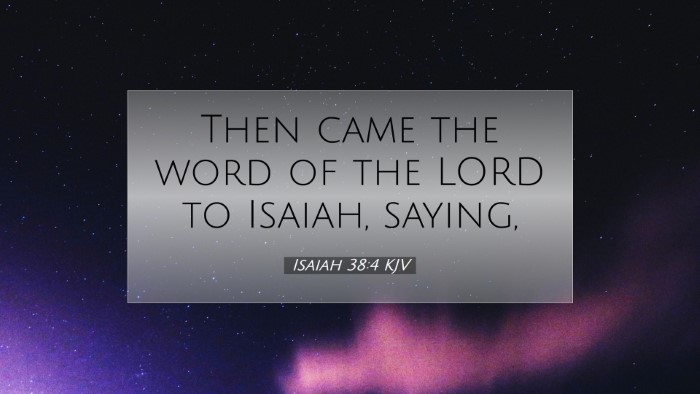Commentary on Isaiah 38:4
Verse: “Then the word of the Lord came to Isaiah: “Go and say to Hezekiah, ‘This is what the Lord, the God of your father David, says: I have heard your prayer and seen your tears; I will add fifteen years to your life.” (Isaiah 38:4, NIV)
Introduction
This verse presents a significant moment in the life of King Hezekiah, laying bare the intimacy of God’s interaction with His people. The narrative highlights themes of prayer, divine mercy, and the dialectical relationship between human agency and divine sovereignty. We will explore insights from esteemed public domain commentators to unravel the depth of this scripture's meaning.
Contextual Background
The historical context of Isaiah 38 reveals Hezekiah, now gravely ill, confronting the prospect of death. The preceding chapters detail his reforms and reliance on Yahweh amidst Assyrian threats. He had demonstrated faithfulness, making this moment of desperation profound in its implications.
- Hezekiah’s Reign: Characterized by religious reforms and trust in God.
- The Assyrian Threat: Contextualizes Hezekiah's dependence on divine intervention.
- Personal Affliction: Highlights the vulnerability and human emotion tied to his condition.
Exegetical Insights
Matthew Henry emphasizes the mercy of God in answering Hezekiah's prayer, reflecting on the compassionate character of God who hears the cries of His children. Henry notes that the personal nature of God is accentuated through the promise made not merely to a king but to a person deeply afflicted.
Albert Barnes reflects on the structural and literary techniques of this passage, indicating the shift from prophetic judgment to divine mercy. He comments on the phrase "I have heard your prayer," underscoring the importance of prayer in a believer's life and God's readiness to respond to sincere supplication.
Adam Clarke provides a deep theological analysis, positing that God’s promise to extend Hezekiah's life demonstrates His sovereignty over life and death. Clarke reflects on the interplay of divine providence and human petitions, calling believers to an active trust in God's plans even amidst desperate circumstances.
Theological Themes
- God's Mercy: This verse showcases the profound mercy of God, who responds to the heartfelt cries of His people.
- The Assurance of God's Presence: The assurance conveyed to Hezekiah signifies God's continuous engagement with His people.
- The Power of Prayer: Illustrates the efficacy of heartfelt prayer and its capacity to invoke divine intervention.
Practical Applications
The richness of this passage extends into contemporary life, challenging pastors and students alike to consider the various dimensions of faith:
- Encouragement in Suffering: Just as Hezekiah poured out his heart to God, believers today are invited to present their struggles to the Lord, assured of His attention.
- Prayer’s Role in Decision Making: There is an implicit demonstration that prayer can and should guide decisions, particularly those that pertain to life and health.
- The Reality of Divine Intervention: The text invites believers to recognize that God can alter the course of natural events in response to faithful prayers.
Conclusion
Isaiah 38:4 encapsulates a rich tapestry of themes relevant to both historical context and contemporary faith. The intersection of divine mercy, the promise of hope, and the immeasurable power of prayer provide a compelling narrative that encourages a deeper understanding of God’s character. As scholars and theologians study this passage, the lessons resonate profoundly, urging the faithful to engage with God in prayer, acknowledge His compassionate involvement in human affairs, and trust in His sovereignty.


